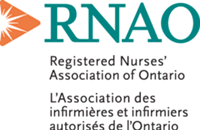RNAO welcomes medical assistance in dying legislation: Bill C-14
TORONTO, April 15, 2016 /CNW/ - Today is an important day for Canadians. The federal government has tabled legislation to implement assisted dying, following the Supreme Court of Canada's February 2015 ruling. The Registered Nurses' Association of Ontario (RNAO) is encouraged the government is moving forward with legislation that will give eligible Canadians access to this important choice.
"Our association is pleased the government listened to our request to grant authority to nurse practitioners (NP) to order and deliver medical assistance in dying," says Dr. Vanessa Burkoski, president of RNAO. "It recognizes the integral role of NPs in improving access to health services."
RNAO is concerned that while the legislation would authorize NPs to provide assisted dying services, Ontario NPs have not been permitted to prescribe controlled substances, despite the association's advocacy to amend regulations under the Nursing Act. The association will continue to urge the provincial government to expand the scope of NPs and RNs, adds Burkoski.
Burkoski says she is also "relieved that registered nurses (RN) and other health professionals involved with assisted dying will be protected from criminal prosecution when following the prescribed safeguards."
While the legislation is silent on the matter of conscientious objection, RNAO believes it is important it does not compel health professionals to provide assisted dying, as noted in supplementary government material released along with the bill. "We believe very strongly that practitioners who opt out still have a duty to refer those seeking assistance in dying to another professional," emphasizes Burkoski. "This legislation is about choice, autonomy and self-determination, so we must avoid creating unnecessary barriers."
"RNAO is very pleased palliative care has been recognized as an essential part of the continuum of care, and that the federal and provincial government have both committed to investing in palliative care. The country must build a comprehensive, evidence-based palliative care approach and services that reach every Canadian in need, regardless of geographic location," says Dr. Doris Grinspun, RNAO's chief executive officer.
The legislation also requires that a second 'independent' medical practitioner or nurse practitioner provide a written opinion confirming a person seeking assistance in dying meets the criteria. While a second opinion is necessary, Grinspun says the 'independent' aspect could create a barrier in smaller, remote or northern communities, where health care is provided by small groups of health practitioners who are affiliated with one another.
"We are mindful of the education that will be required to implement this legislation. Practitioners who fail to comply with all the requirements when providing assisted dying would be guilty of an offence. Therefore we are calling for extensive education for health professionals around their requirements, rights and obligations," Grinspun says, adding RNAO is ready to help, given its expertise and commitment to education.
The association applauded the bill for mandating information collection from assisted dying, which is central to ensure the service is provided as intended.
"The tabling of this legislation is an important step in providing Canadians with choice," Grinspun adds. "We must now consider all these issues to ensure we are moving in the right direction."
The Registered Nurses' Association of Ontario (RNAO) is the professional association representing registered nurses, nurse practitioners, and nursing students in Ontario. Since 1925, RNAO has advocated for healthy public policy, promoted excellence in nursing practice, increased nurses' contribution to shaping the health-care system, and influenced decisions that affect nurses and the public they serve. For more information about RNAO, visit our website at RNAO.ca or follow us on Facebook and Twitter.
SOURCE Registered Nurses' Association of Ontario

or to interview a nurse, please contact: Daniel Punch, Communications Officer/Writer, Registered Nurses' Association of Ontario (RNAO), Phone: 416-408-5606 / 1-800-268-7199 ext. 250, [email protected]

Share this article